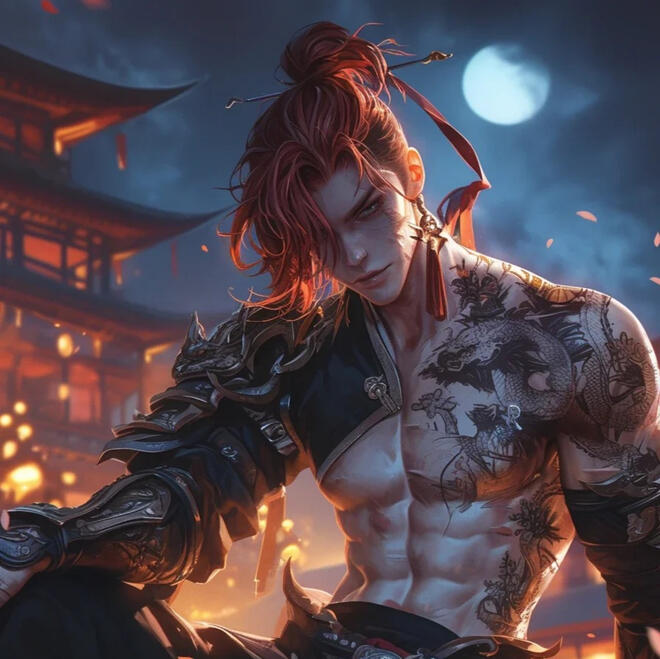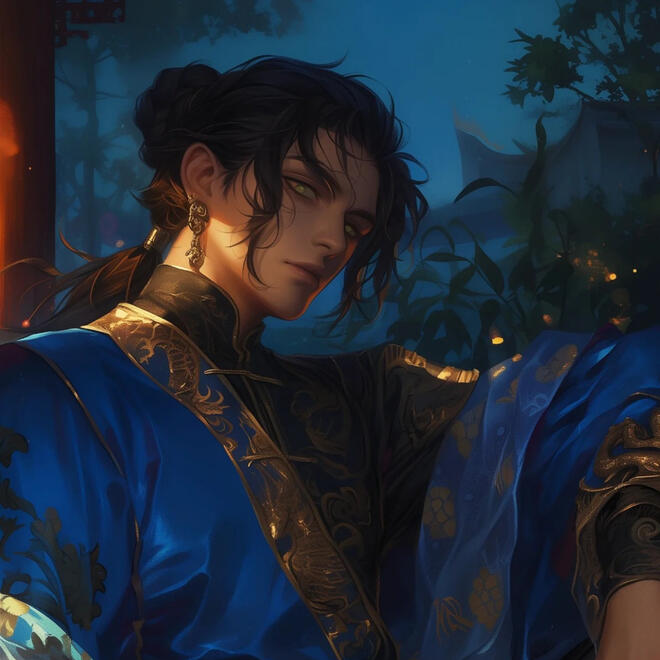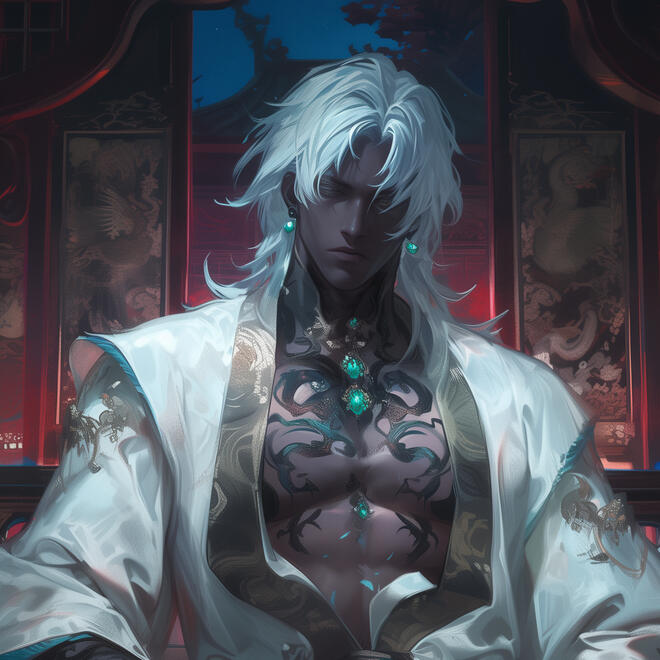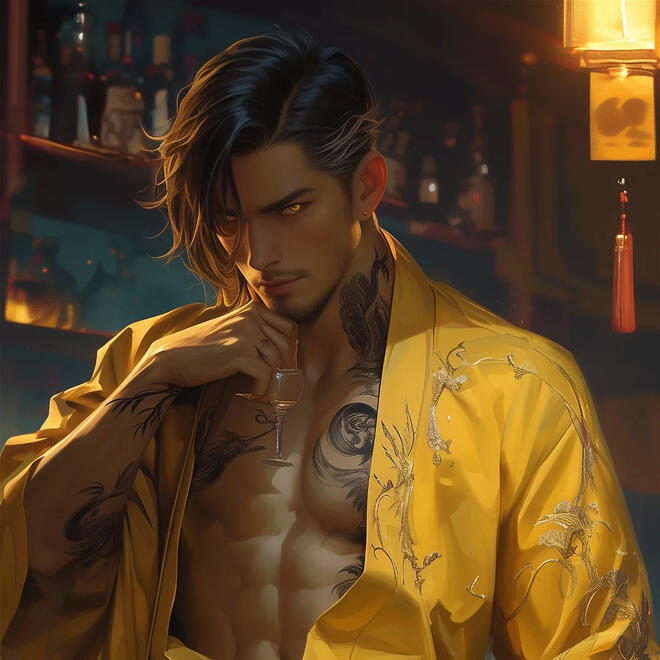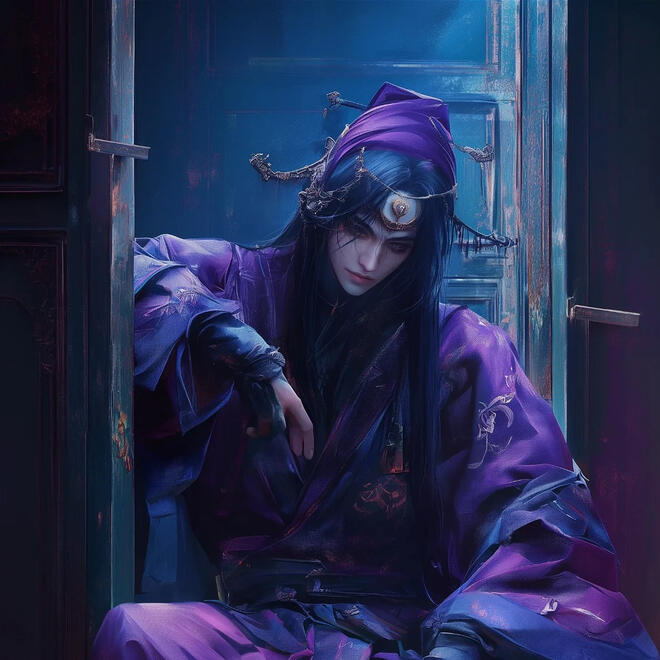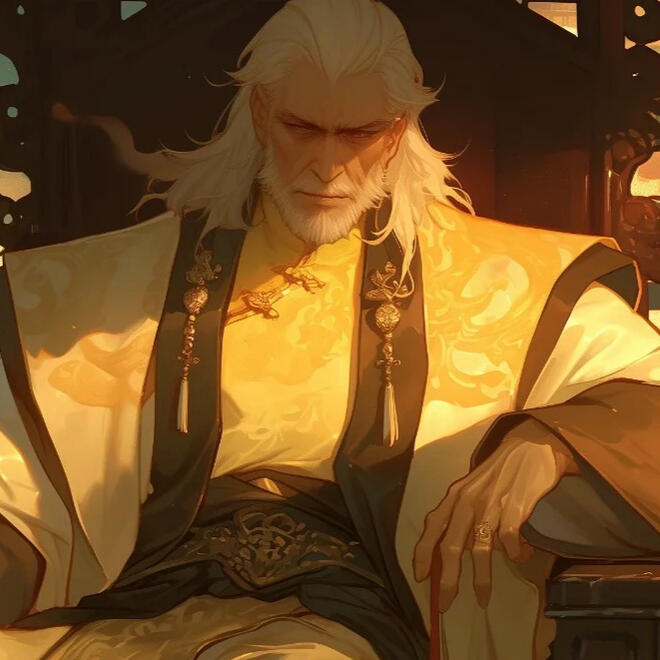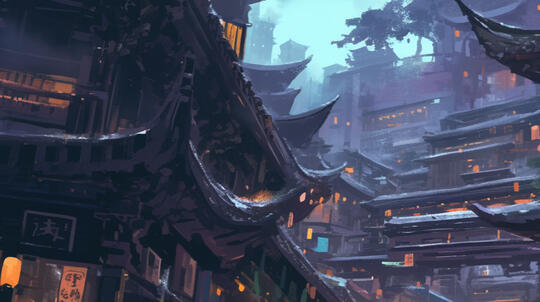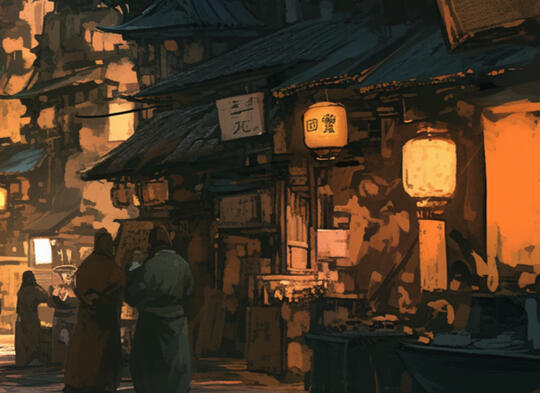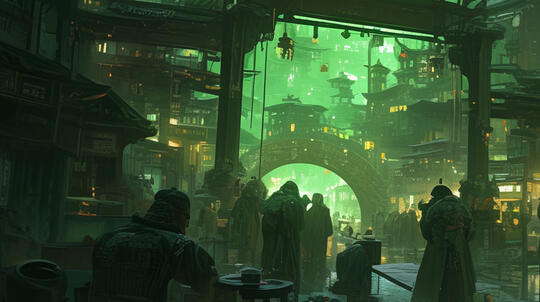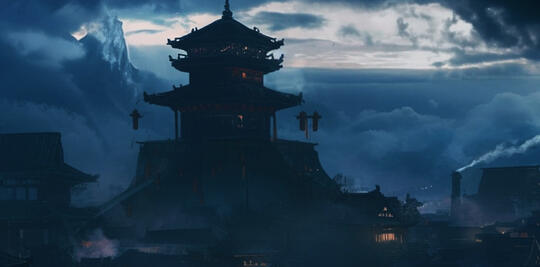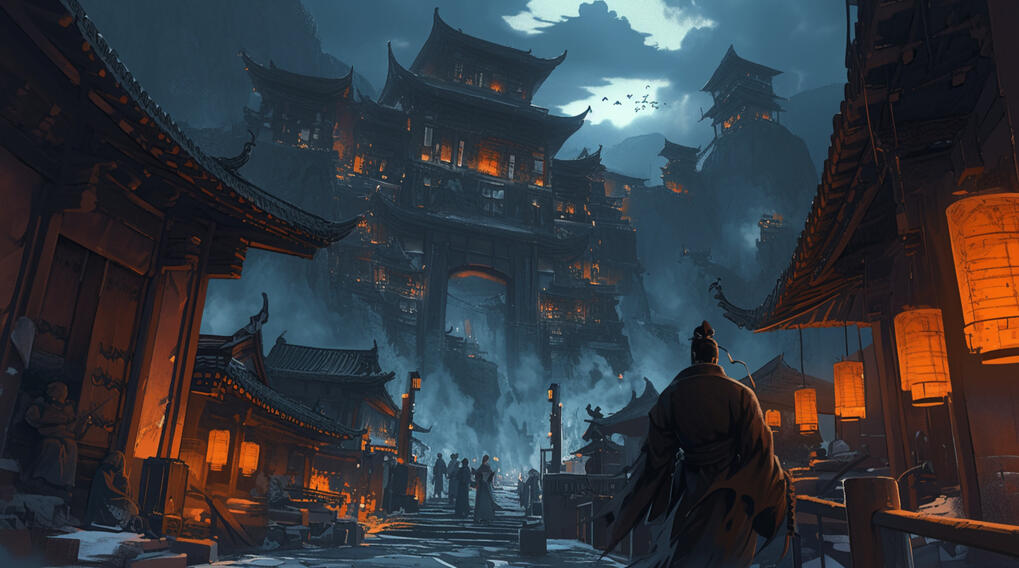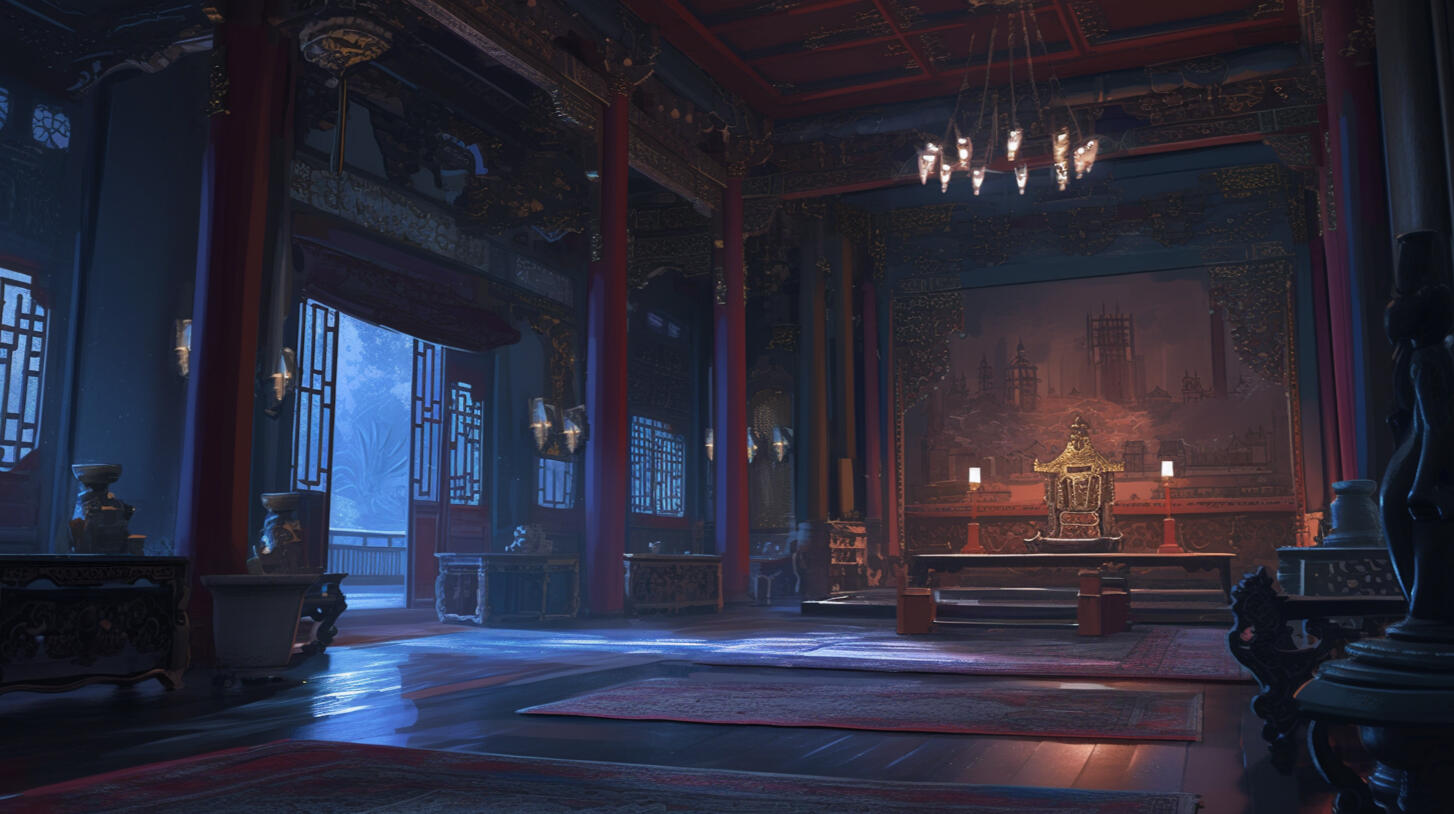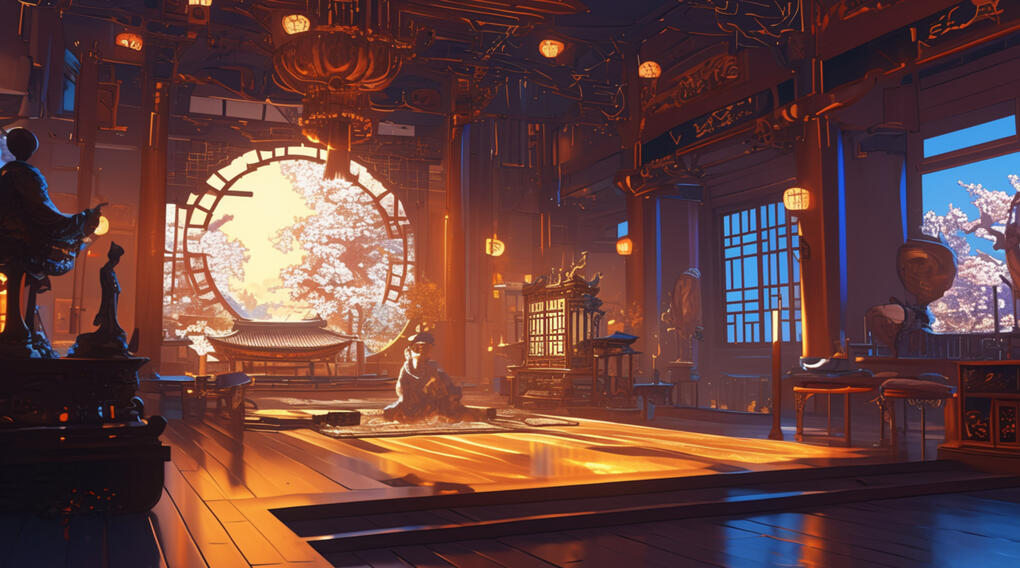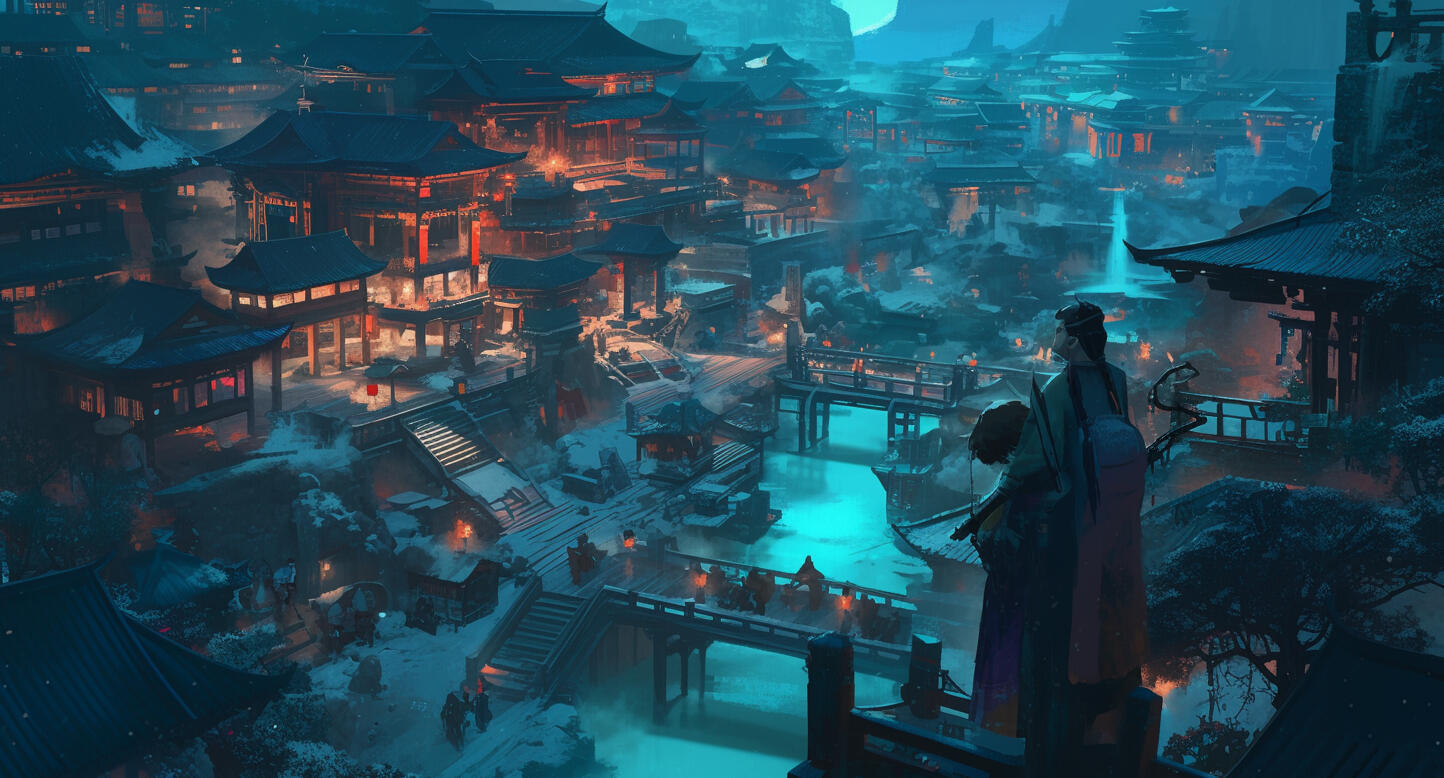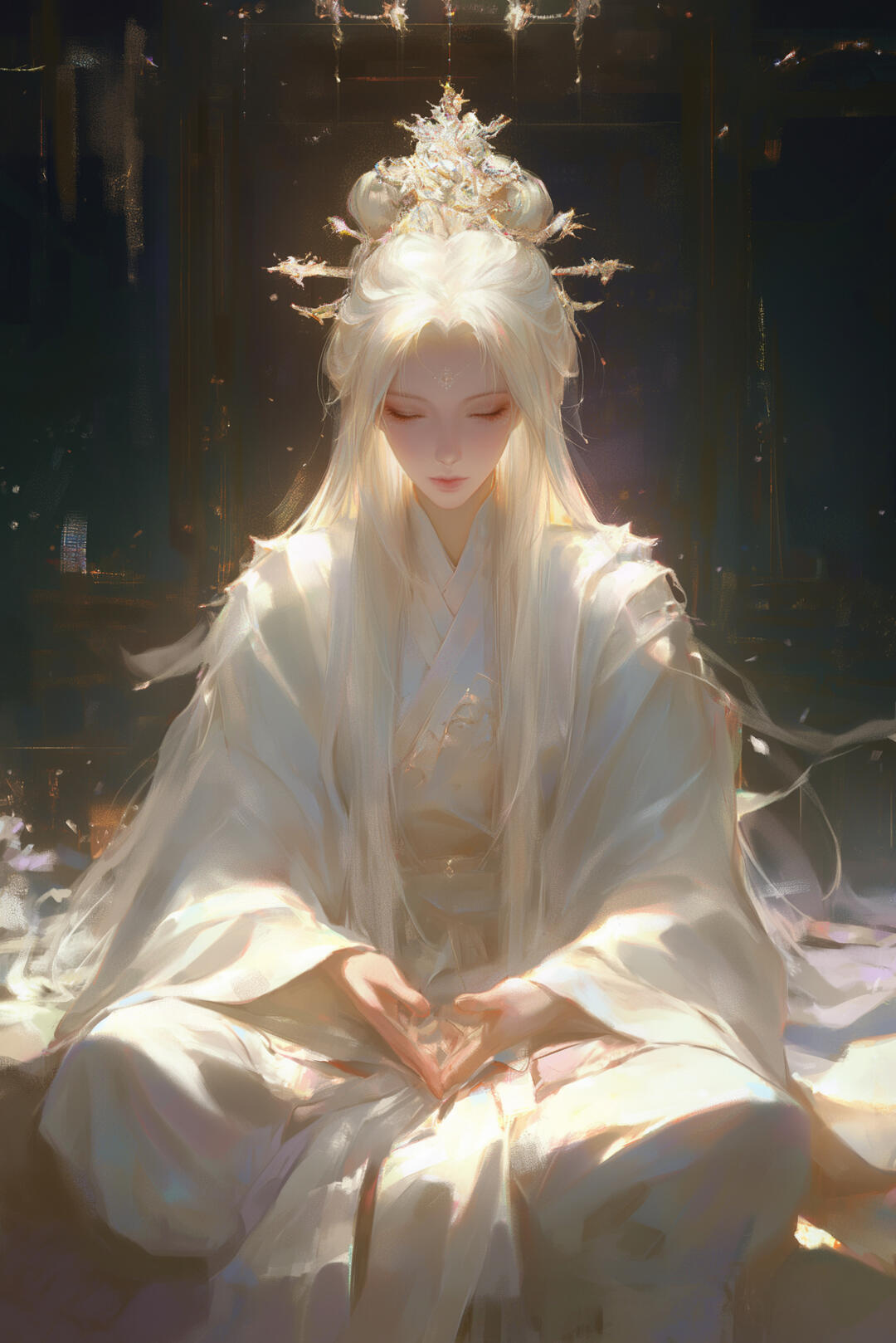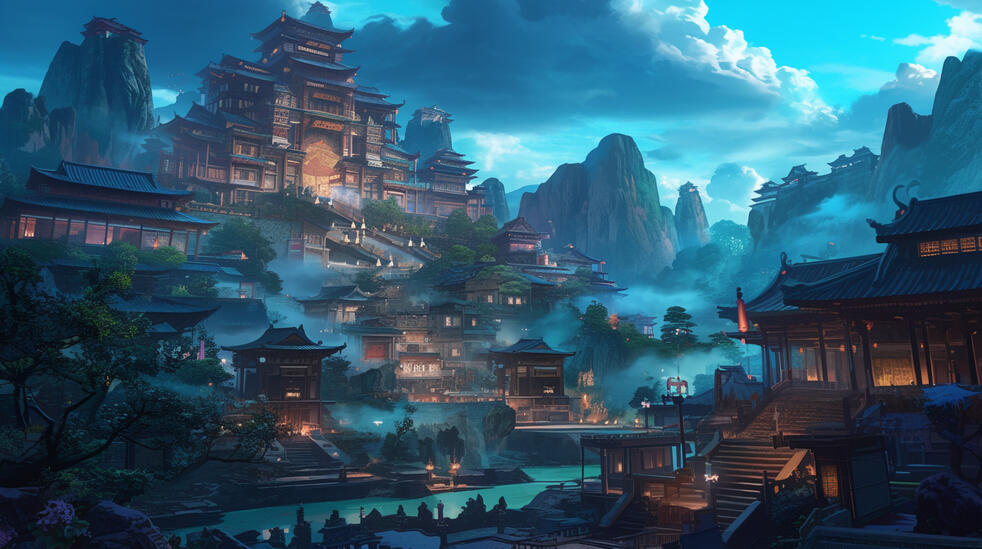Xiān Jiǔ Guǎn (仙酒馆)
The town is the border between humans and spirits of all kinds.
Genre: Dark fantasy, Wuxia, Xianxia.
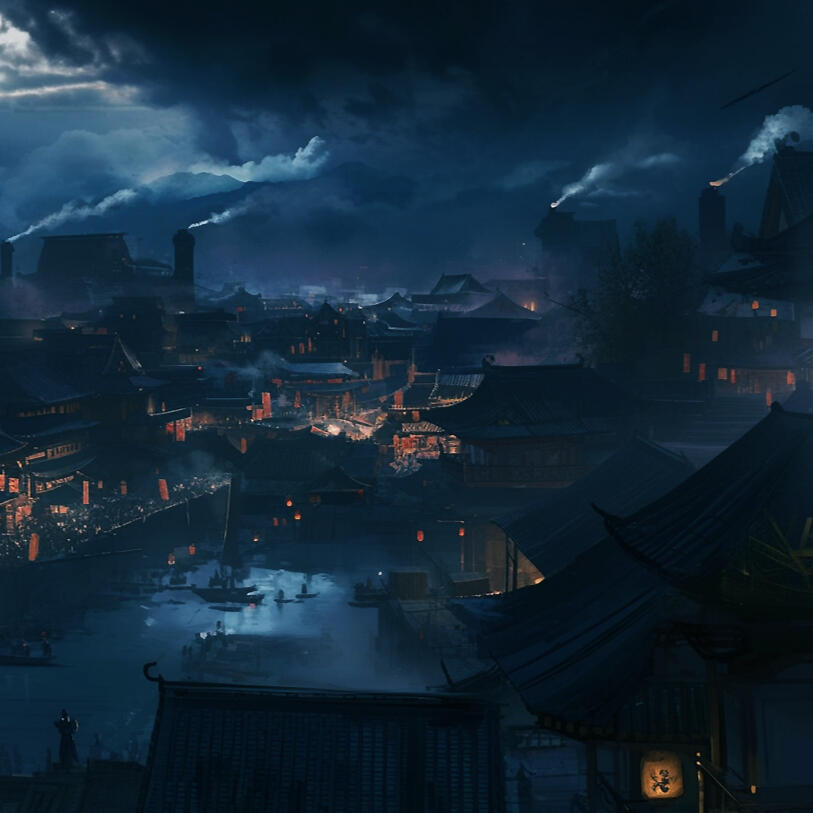
Deep within the heart of Ancient China lies Xiān Jiǔ Guǎn, a town burdened by a unique curse. Here, the veil between the living and the dead is tragically thin, making it a haven for restless spirits. Hundreds of thousands of these ethereal beings linger, unable to find peace.
Standing guard are the Jīngshén chēduì (精神战队) - Spirit Convoyers. This elite group of five warriors possesses the extraordinary ability to see and interact with the spirit world. Their mission: to guide these lost souls to their final resting place and restore balance between the realms.
Jīngshén chēduì
After death, humans in this world face two possibilities. One path leads to a seamless transition into the void, a state of eternal existence. The other awakens them as spirits, creatures taking on a demi-human or monstrous form based on their emotions and life experiences. These spirits remain invisible to most humans.
However, those with a rare brain anomaly called Kànbújiàn (看不見), meaning "unseen," possess the ability to perceive them. This anomaly isn't hereditary; some are born with it, while others develop it through intense training lasting five years or through unwavering belief.
These individuals with Kànbújiàn are the only ones who can become jīngshén chēduì, spirit convoyers. Out of thousands of them in china, only 5 are the masters. They oversee the 5 sections in the town and answer to Master Wén Bái, a being who has achieved total mastery over Jingshen (spirit) and has lived for millennia. To become a jīngshén chēduì master like him, they must not only refine their own Jingshen but also vanquish countless evil spirits, a feat that grants them immortality. Anyone with Kànbújiàn can go to the temple Master Wén Bái lives in and be trained into jīngshén chēduì. But it takes those who master their Jingshen who have a chance to become masters.Qi is also important to learn, it's the only working defense against the spirits.
Jīngshén
The common translation of the word Jingshen is spirit or spirituality. In Ren Xue it refers to the totality of the heart (Xin), consciousness , and True Self (Shen) . These three components have close connection with one another and therefore can be seen as a unity. Jingshen is the term for this unity.Xin, the heart refers to the manifestations of the Shen and Qi of the heart, rather than the physical organ. It is the place where we perceive the feelings that the activities of our consciousness and Shen lead to. In its natural state Xin itself also has many innate qualities, including the five essential qualities – trust, openness, love, gratitude, and Gongjing (true respect). Those qualities can be felt in the heart and manifest as we relate to the outer world.
Yi, the consciousness is the outward manifestation of Shen and comes about from the integration of Shen and the physical aspects of life, especially the brain and nervous system. Sometimes in Ren Xue teachings the words Shen-Yi (Unity of Shen and consciousness) or Shen-Yi-Ti (Shen, consciousness base) are used.Shen, the True Self is the source of the heart and consciousness. In physical terms it is based at the center of the head. It is strongly connected to and influences the Qi and the body , but it is in no way bound by the physical body.To master ones Jingshen, they must go to the Temple of the Spirit Clouds in the middle of the empire where they will be trained. It normally takes 5 years to master Jingshen, which while they do so they train in martial arts, Qi and do missions while doing so. Just having Kànbújiàn isn't enough, as anyone can develop it and go to Master for training. In rare instances, when Master sees something in someone, they can become a jīngshén chēduì master. Then they will join the 5 masters guarding each section.
QiQi refers to the metaphysical energy that flows throughout the human body. It is a concept that serves as the root of martial arts, defense against the Spirits and an array of other skills. Though it resides in all living things, those who have exhibited the closest connection and the largest concentration of chi are the Five Masters, Master Wén Bái, and those born from the Indigo District.
Different forms of martial arts is merely the ability to manipulate one's chi to the point where the energy can extend beyond the body and interact with the environment. Enlightened individuals such as Master Wén Bái further explained the concept of chi as the life energy that dwells inside every living being connecting them to each other, their surroundings, and the universe as a whole. Different parts of the human body contain concentrated clusters of chi, better known as chakras, or "pools of energy" as Master Wén Bái called them. When unlocked, these chakras are crucial for the Jīngshén chēduì to achieve their full potential, channeling their own energy as well as the energy from the universe.
Xiān Jiǔ Guǎn
In Ancient China, Xiān Jiǔ Guǎn is the most notable Duchéng (都城) and empire. It’s heavily populated and full of travelers from all over China. In the middle of Xiān Jiǔ Guǎn is a large temple, where those training to be jīngshén chēduì (精神車隊) go to live and learn for 5 years. Xiān Jiǔ Guǎn is split into 5 districts, all overseen by one jīngshén chēduì who is a master at their skill and undefeated. The empire is 32.02K mi² and the only way inside is one heavily guarded dock entrance from sea. Where visitors go through a mountain passage and on the other side is the big empire surrounded by mountains.The empire is led by Empress Dowager Xie serving as a regent for her husband who is sickly.
The Red District.Nestled in the heart of the region, the Red District pulses with a palpable energy. Its residents are known for their fiery temperaments, quick to anger but equally quick to embrace life's passions. This vibrant town teeters on the edge of volatility, its streets alive with the fervent pursuits and strong sense of community that define its people. At the center of this maelstrom stands Master Bull, the formidable spirit hunter master. Volatile, loud, and short-tempered, he cuts an imposing figure. Yet beneath his gruff exterior beats a heart of gold, one that drives him to be merciless in his defense of the town, vanquishing both benevolent and malevolent spirits with equal ferocity.
The Blue District.The Blue District exudes an air of serenity and tranquility. Its residents are known for their even temperaments, slow to anger and remarkably open-minded when it comes to encounters with benevolent spirits. This community celebrates a deep fascination with the supernatural, often providing safe harbor for friendly spirits within their homes. At the heart of this oasis of knowledge and enlightenment stands Master Dove, the jīngshén chēduì master. Embodying the district's ethos, he remains calm, stoic, and profoundly peaceful. Unlike his counterparts elsewhere, Master Dove is content to allow good spirits to roam freely, recognizing their inherent worth and the balance they bring to the world.
The Green District.The Green District exudes an air of harmony with nature and deep-rooted traditionalism. Its people cling steadfastly to the ways of the past, employing ancient methods in all facets of their daily lives. In this village, the natural world takes precedence, with lush greenery and verdant landscapes. It is from these hallowed grounds that the empire's vital food supplies are cultivated by the diligent farmers. At the center of this section stands Master Peacock, the jīngshén chēduì master. Embodying the district's stubborn adherence to tradition, he is a stoic and unyielding figure. Yet, like the land he protects Master Peacock holds an open mind when it comes to the presence of benevolent spirits, allowing them to roam freely through the verdant expanses.
The Indigo District.The Indigo District captivates with its air of secrecy. The residents here are notoriously close-knit, guarded against the prying eyes of outsiders. This town is permeated by an all-consuming obsession with the spirits. Yet, beneath the veil of mystery lies a deep-seated mistrust of these otherworldly entities. An unspoken rule dictates that spirits are only to be discussed when it comes to their eradication. Due to a high affinity of people who can see spirits coming from here, the Indigo District is also coined as the "Birthplace of defense." At the epicenter stands Master Owl, the jīngshén chēduì master. Shrouded in an impenetrable aura of mystique, he strikes down spirits with ruthless efficiency. Master Owl despises spirits.
The Yellow District.Radiating an infectious aura of optimism and joy, the Yellow District captivates all who venture within its vibrant bounds. The people here exude a palpable enthusiasm, their creativity and close-knit bonds shaping a community that teems with life and positive energy. It is here that some of the empire's most renowned tradespeople ply their crafts, their innovative spirits fueling the district's economic prosperity. At the heart of this cheerful enclave stands Master Dolphin, the jīngshén chēduì master. Embodying the district's spirited ethos, he is a playful, cocky, and irrepressibly happy individual. Unlike his counterparts in other districts, Master Dolphin holds no qualms about allowing benevolent spirits to roam freely, often working alongside them in pursuit of his duties.
Yūnshén Sì (雲神寺)
Temple of the Spirit Clouds
ㅤ
Located at the middle of the town, mountainous area away from the hustle and bustle of the capital city.
Surrounded by dense forests and natural landscapes, creating an atmosphere conducive to spiritual cultivation. Architecturally, the temple features pagodas, ornate gateways, and intricate carvings depicting celestial beings and mythical creatures. Inside, the temple houses shrines, meditation halls, and specialized training areas for the aspiring jīngshén chēduì.
The temple would be overseen by a revered Grand Master Wén Bái, a highly skilled and experienced jīngshén chēduì master who is immortal, the greatest in asia. Only those deemed worthy by the Grand Master would be accepted as disciples and allowed to undergo the rigorous 5-year training program.
Jingyang PalaceThe Jingyang Palace is a grand imperial palace complex that served as the primary residence for the royal family in Ancient China. Situated at the very back of Xiān Jiǔ Guǎn, the Jingyang Palace occupied a vast and strategically located expanse of land, surrounded by high walls and imposing gates. The palace grounds were meticulously laid out, with a harmonious blend of grand architectural structures, lush gardens, and serene bodies of water. At the heart of the palace stood the main throne hall, a towering edifice with an intricate, curved roofline that seemed to ascend towards the heavens. The exterior walls of the hall were adorned with intricate carvings and magnificent murals, depicting scenes of imperial triumph, mythological figures, and the celestial realm. Flanking the throne hall were a series of auxiliary palace buildings, each serving a specific function - the imperial libraries, the queen's private quarters, the imperial ancestral temples, and the training grounds for the imperial guards. The Jingyang Palace grounds were carefully landscaped, with winding paths, tranquil ponds, and meticulously pruned gardens. Exotic flora and fauna from across the empire were cultivated within these serene outdoor spaces, creating a harmonious blend of nature and architectural splendor. At the edges of the palace complex stood the defensive walls, adorned with towering watchtowers and imposing gatehouses. Within the confines of the Jingyang Palace, the Emperor, Empress, and their kin live.
Yòu Hún
There exists a dichotomy within the realm of the supernatural, divided between the restless yet benevolent spirits and their malevolent counterparts.
SPIRITSThe good spirits, often described as 'restless', are compelled to wander in search of purpose, their kind natures leading them to seek connection with the mortal world. These ethereal entities are destined to be conveyed to the void by the Spirit Conveyors, a fate they often accept with resignation. In an effort to delay their inevitable departure, some good spirits will even adopt human forms, blending seamlessly into the lives of the living. They resemble their human selves and stay the same size.
In stark contrast, the bad spirits are born of tragic demises and tainted emotions. These dark entities manifest in a variety of unsettling guises, from demihumans to monstrous forms. Driven by a primal hunger, they prey upon the unsuspecting, inflicting sicknesses and diseases upon their hapless victims. The most powerful of these malevolent spirits can even make themselves visible to those without the innate ability to perceive the supernatural, using their nefarious powers to torment and drain the life force from the living. They can manifest in many sizes and forms.
